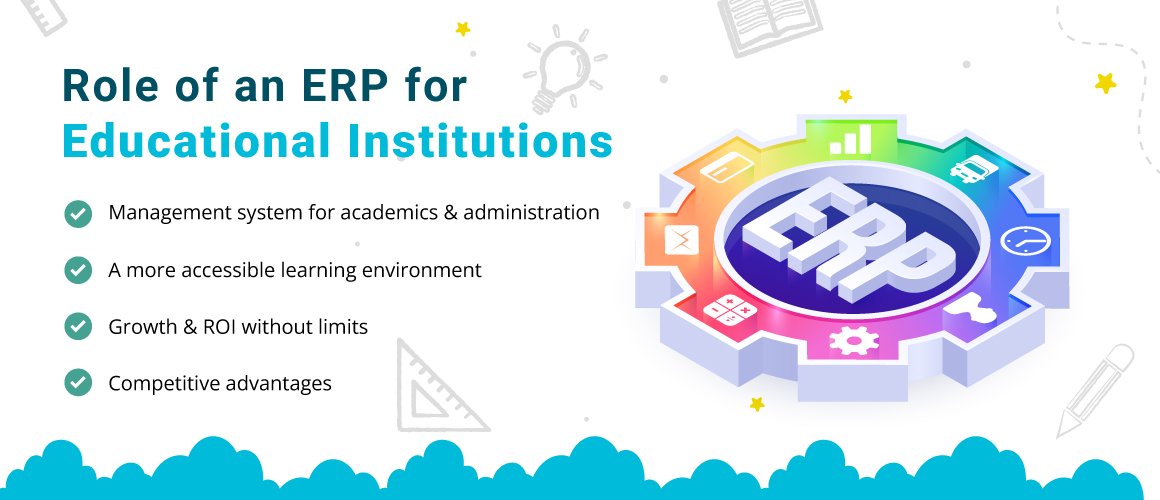Streamlining Education Management: The Role of ERP Solutions for Educational Institutions
In today's fast-paced digital age, the education sector is undergoing a significant transformation. Educational institutions, ranging from schools to universities, are increasingly relying on technology to streamline their administrative processes, enhance student learning experiences, and improve overall efficiency. One such technological solution that has gained widespread popularity in recent years is Enterprise Resource Planning (ERP) systems tailored for educational institutions. These ERP solutions offer a comprehensive suite of tools designed to address the unique challenges faced by educational institutions, from managing student records to optimizing resource allocation. In this blog post, we will explore the benefits and functionalities of ERP solutions for educational institutions.
Understanding ERP Solutions for
Educational Institutions
ERP solutions for educational
institutions are specifically designed to meet the diverse needs of
academic organizations. These solutions typically offer modules that cover
various aspects of institutional management, including:
Student Information Management:
ERP systems centralize student data, including enrollment information, academic
records, attendance, and grades. This centralized database ensures data accuracy,
facilitates easy access to information, and streamlines administrative tasks
such as enrollment, registration, and student tracking.
Faculty and Staff Management:
Educational ERP solutions enable institutions to manage faculty and staff
information, including hiring, payroll, scheduling, and performance
evaluations. By automating these processes, institutions can optimize staff
utilization, ensure compliance with regulations, and improve overall workforce
management.
Financial Management: ERP systems
help educational institutions manage their finances effectively by automating
budgeting, accounting, procurement, and invoicing processes. These solutions
provide real-time insights into financial performance, facilitate accurate
budget forecasting, and ensure transparency and accountability in financial
transactions.
Academic Planning and Course
Management: ERP solutions assist institutions in planning and managing academic
programs, courses, and curricula. These systems enable efficient course
scheduling, resource allocation, and academic planning, ensuring that
institutions can offer diverse and well-organized educational programs to meet
student needs.
Resource Management: ERP
solutions optimize the utilization of institutional resources, including classrooms,
laboratories, equipment, and facilities. By providing visibility into resource
availability and usage patterns, these systems help institutions make informed
decisions about resource allocation and utilization, thereby maximizing
efficiency and reducing costs.
Student Engagement and Support:
ERP solutions often include features to enhance student engagement and support
services, such as online learning platforms, student portals, and communication
tools. These tools facilitate collaboration, communication, and access to
educational resources, fostering a supportive learning environment for
students.

ERP Solutions For Educational Institutions
Benefits of ERP Solutions for
Educational Institutions
Implementing an ERP solution
tailored for educational institutions offers numerous benefits, including:
Improved Efficiency: By
automating repetitive tasks and streamlining processes, ERP solutions help
educational institutions operate more efficiently, reducing administrative
overhead and allowing staff to focus on value-added activities.
Enhanced Data Accuracy and
Integrity: Centralizing data within an ERP system ensures data consistency,
accuracy, and integrity, minimizing errors and redundancies associated with
manual data entry and disparate systems.
Better Decision-Making: ERP
solutions provide institutions with real-time access to comprehensive data and
analytics, enabling informed decision-making and strategic planning across all
areas of institutional management.
Increased Transparency and
Compliance: ERP systems promote transparency and accountability in
institutional operations by standardizing processes, enforcing policies, and
ensuring compliance with regulatory requirements and accreditation standards.
Enhanced Student Experience: By
streamlining administrative processes, providing access to educational
resources, and facilitating communication and collaboration, ERP solutions
contribute to a positive student experience, ultimately improving student
satisfaction and retention.
Cost Savings: While the initial
investment in an ERP system may be significant, the long-term cost savings
associated with improved efficiency, reduced operational overhead, and
optimized resource utilization can deliver a significant return on investment for
educational institutions.
Key Considerations for
Implementing ERP Solutions
While the benefits of ERP
solutions for educational institutions are clear, successful
implementation requires careful planning and consideration of various factors,
including:
Alignment with Institutional
Goals: Before selecting an ERP solution, institutions should clearly define
their goals and objectives for implementing the system, ensuring that the
chosen solution aligns with their strategic priorities and operational needs.
User Training and Support:
Adequate training and support are essential to ensure successful adoption of an
ERP system by faculty, staff, and students. Institutions should invest in
comprehensive training programs and provide ongoing support to users to
maximize system utilization and effectiveness.
Data Security and Privacy:
Educational institutions must prioritize data security and privacy when
implementing an ERP solution, ensuring compliance with relevant data protection
regulations and adopting best practices for safeguarding sensitive information.
Scalability and Flexibility: As
educational institutions grow and evolve, their ERP needs may change.
Therefore, it is essential to select a scalable and flexible ERP solution that
can adapt to future requirements and accommodate growth without significant
disruption.
Integration with Existing
Systems: Integration with existing systems and applications is critical to
ensure seamless data exchange and interoperability across the institution's IT
ecosystem. Institutions should carefully assess the compatibility and
integration capabilities of ERP solutions with their existing infrastructure.
Vendor Reputation and Support:
Choosing a reputable ERP vendor with a track record of success in the education
sector and strong customer support services is essential to mitigate risks and
ensure a smooth implementation process.
Conclusion
In conclusion, ERP solutions
tailored for educational institutions play a vital role in modernizing and
optimizing institutional management processes. By centralizing data, automating
tasks, and providing comprehensive functionality across various areas of
institutional management, ERP systems enable educational institutions to
operate more efficiently, enhance the student experience, and make informed
decisions to support their strategic objectives. However, successful
implementation requires careful planning, user training, and consideration of
key factors such as data security, scalability, and vendor support. With the
right ERP solution in place, educational institutions can streamline their
operations, improve productivity, and stay competitive in today's rapidly
evolving educational landscape. Learn more

Comments
Post a Comment